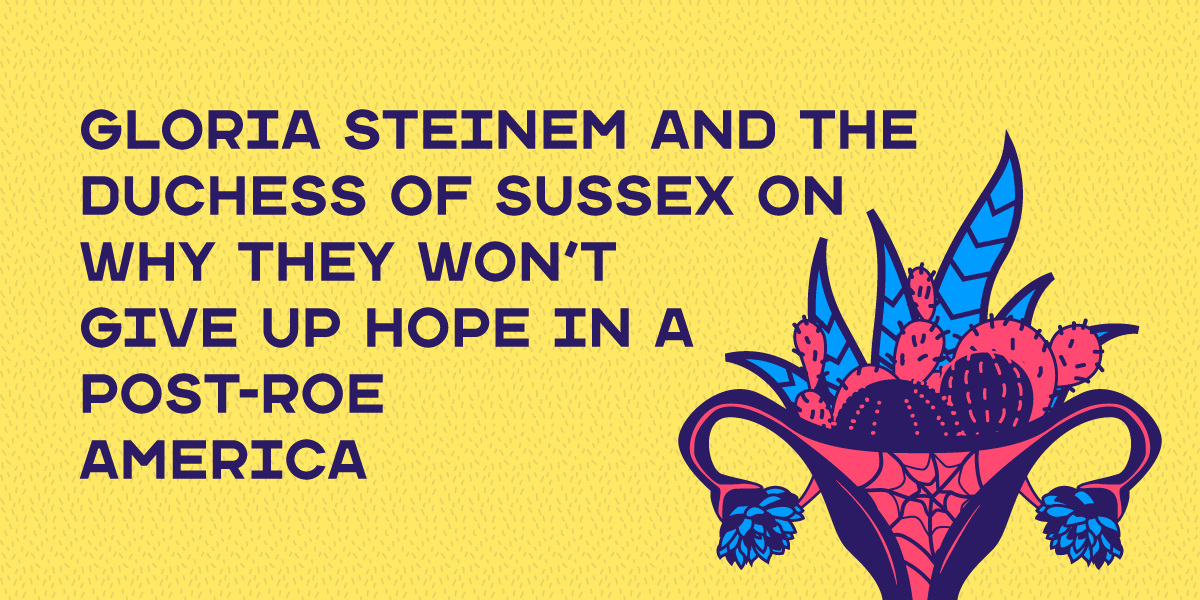When the news came down that the Supreme Court had officially struck down Roe, award-winning journalist Jessica Yellin decided to call on two heavy hitters for feminism to talk about life in a post-Roe America: Gloria Steinem and the Duchess of Sussex.
Gloria Steinem is synonymous with women’s rights, and the Duchess of Sussex has stood against archaic institutions as a champion for using your voice.
The two met in 2020 when Meghan found out that she and Gloria were both sheltering in place in Montecito California, and asked her to help her make calls thanking voter-registration organizers. Now they’re working together to ratify the Equal Rights Amendment.
If the ERA is ratified it would codify into law:
- Equal protection from discrimination for ALL PEOPLE
- A clear federal judicial standard for deciding cases of sex discrimination
- Provide a strong legal defense against the rollback of women’s rights
https://www.instagram.com/p/CfXPQS5hlsg/
Gloria and Meghan spoke at length to Jessica Yellin about why it is vital to keep hope.
I’ve included some excerpts but make time to go read the entire thing if you can.
Meghan on trigger laws and life in those states: “This is having a very real impact on women’s bodies and lives starting now. Women are already sharing stories of how their physical safety is being put in danger. Women with resources will travel to get an abortion, those without might attempt to give themselves one at tremendous risk. Some will have to source abortion pills from unregulated pharmacies. Others who are pregnant and find themselves in a medical emergency will be at the mercy of doctors and lawyers to determine if a procedure that is needed to save her life can even be done at all. What does this tell women? It tells us that our physical safety doesn’t matter, and as a result that we don’t matter. But we do. Women matter. And this is one of the reasons that I called Gloria immediately. Because in all of it, she reminds me that when you have anger, you have to channel that energy into something that makes a difference. That’s what activism is. It’s about how we show up.”
On maternal mortality rates: M: These issues are systemic, interconnected, and preventable. Women of color and especially Black women are most impacted by these decisions because most of us don’t have the same access to health care, economic opportunity, mental health resources…the list goes on. It’s difficult to overstate what this decision is going to do to these communities.
G.S.: When I first entered into this struggle for reproductive freedom as a fundamental human right, it was the 1970s. Ruth Ginsburg was with the ACLU and she sent me to Alabama to talk with a Black woman who had been sterilized without her knowledge or permission when she went into the hospital for something else entirely. So, you know, this was a struggle with quite a few state legislatures to keep them from allowing the sterilization of women who were on public support.
Gloria on what to do next, and how to make a difference: “It depends where the person is. If they’re living in an anti-choice state or with a state that has a majority anti-choice legislature, then working politically is very important. If they’re in a pro-choice state where the clinics are being picketed or not supported, then it’s important to protect and support those clinics. But wherever we are, we can make clear that reproductive freedom is a fundamental right like freedom of speech.
We are the only democracy in the world that doesn’t include women in its constitution. I think we should put big billboards up in every airport where people arrive from other countries saying, “Welcome to the only democracy in the world that doesn’t include women.” Maybe that would embarrass people into action. All the necessary states have ratified [the ERA], and it just needs acceptance in Congress. So if the president made it a priority, it could happen. It means that we would be on the same standing of inclusiveness as every other democracy in the world.”
Meghan on the role men play in the fight for equal rights: “Men need to be vocal in this moment and beyond because these are decisions that affect relationships, families, and communities at large. They may target women, but the consequences impact all of us. My husband and I talked about that a lot over the past few days. He’s a feminist too, and his reaction last week was guttural, like mine.”
**Meghan on hope: “**I know that for so many women right now, there is a sentiment of despair. But again, we have to band together and not wallow. We have to do the work.“
Gloria on hope: “I think we need to remember that hope is a form of planning. If you’re not hopeful, you’ve given up.
